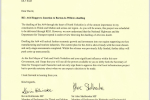The historic new free-trade agreement, the first major trade deal negotiated from scratch since we left the EU, will create new opportunities for British businesses and consumers across the UK. Once the details are known I will scrutinise it carefully to make sure that it is fair to constituents, especially farmers, who I know have been worried about the effect it could have on food, animal welfare and environmental standards. Ministers have been clear that our high standards will not be impacted and I will follow it closely to ensure that this is the case.
In a nutshell, the main benefits are:
- The deal will not undercut UK farmers or compromise our high standards. Our ban on imports of beef raised using hormones will remain and there will be a chapter in the agreement to deal with animal welfare standards and make sure we are on a fair and level playing field with Australian producers. I have already contacted trade ministers and asked for these protections to include prohibitions on meat produced using antibiotics as growth promoters. The agreement will be overseen by the Trade and Agriculture Commission, a body made up of food and farming industry representatives, and its report will be presented to Parliament. In advance of that presentation, it will be given to the International Trade Committee and to the Chairman of the Environment, Food and Rural Affairs Committee for scrutiny. It will then go to Parliament and go through the Constitutional Reform and Governance Act process, during which MPs are able to block the deal if they do not support it. Internal Whitehall analysis shows little to no impact once projected productivity improvements are taken into account. Any changes for sensitive goods such as beef and lamb can be staged - with 10-15 years being the norm for FTAs with Australia.
- Delivering tariff free trade for all British goods. The deal removes tariffs on £4.3 billion of exports, making it cheaper to sell iconic products like cars, Scotch whisky and ceramics into Australia – supporting 3.5 million jobs across the country. Car makers in the Midlands and the North of England will also benefit.
- Making it easier for Brits to travel and work in Australia. British people under the age of 35 will be able to travel and work in Australia for up to three years, opening up major opportunities for younger people. Highly skilled professionals will now be able to work in Australia temporarily, and Aussie firms will no longer have to prioritise hiring Australian nationals first.
- Delivering lower prices and more choice for British shoppers. The elimination of tariffs on Australian favourites like Jacob’s Creek and Hardys wines, TimTams and Vegemite will boost choice for British consumers and save British households up to £34 million a year.
- Enhancing access for British tech companies. The deal will create opportunities for the UK’s cutting edge digital and tech sectors, preparing us to lead in industries of the future like AI, space exploration and low emissions technology.
- Making it easier for lawyers and other professionals to work in Australia without re-qualifying. UK lawyers will be able to practice in Australia without having to requalify as an Australian lawyer. The deal will allow for the recognition of UK professional qualifications across many sectors, creating opportunity for our professionals while allowing British companies to attract and retain global talent.
- Boosting UK services industries. The UK exported £5.4 billion worth of services to Australia in 2020 accounting for more for 56 per cent of our total exports to the country. The combined effect of the deal’s cutting-edge provisions, allowing UK and Australian service professionals access to each other’s markets, and reduced barriers to investment will give a substantial lift to the UK’s service sectors.
- Slashing red tape for entrepreneurs and small business. Red tape and bureaucracy will be torn down for more than 13,000 small businesses across the length and breadth of the UK who already export goods to Australia. The agreement will deliver quicker export times and ensure small business have access to new intelligence that will better allow them to seize the opportunities created by the deal.
- Creating access to billions of pounds worth of new opportunities for UK firms. British companies will now be able to bid for additional Australian government contracts. It is the most substantial level of access Australia has ever granted in a free trade agreement, including in transport and financial services. This is also a key stepping stone to the Comprehensive and Progressive Agreement for Trans-Pacific Partnership, a trade agreement among Australia, Brunei, Canada, Chile, Japan, Malaysia, Mexico, New Zealand, Peru, Singapore, and Vietnam. By 2030, CPTPP countries will be eating 25% of the world’s meat.
- Paving the way to CPTPP. Australia strongly supports UK membership of CPTPP, which would further open up eleven Pacific markets worth £9 trillion. CPTPP membership will secure British exports superior access to these growing markets, with one third of middle class consumers expected to be in Asia by 2030.
You can find the answers to the most commonly asked questions here:

